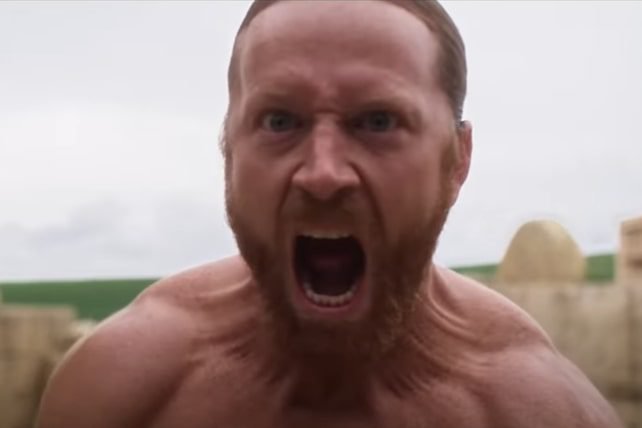
What if, in his early days as a humble carpenter in Nazareth, before he amassed his 12 disciples or turned water into wine, Jesus befriended a mixed martial arts fighter?
This is the basic premise of “The Carpenter,” a new Jesus movie out in theaters near you.
As the movie begins, we meet Oren (Kameron Krebs), a ginger Viking adopted as a child by a local — why not, I guess — as he handily thrashes an opponent to the accompaniment of loud, thrumming heavy metal music. But when his adoptive father dies, his final wish is that the family should move to Nazareth. There Oren meets Yeshua, a local carpenter beloved by the entire town, who also likes to hand out hand-carved wooden toys to the village children and do other works of charity. He invites Oren to be his apprentice and miraculously heals the fighter’s latest MMA-induced black eye.
The rest of the film cuts back and forth between “Rocky”–style training montages and aphorisms from Yeshua, delivered as the two men sand wood. Oren jogs through the Jerusalem hills and does reps on a makeshift lat machine made out of a boulder and rope strung over a rafter. Oren learns to build a table as Yeshua tells him about how “pain and suffering are of value” and doles out bread to villagers.
“The Carpenter” is part of a growing trend of Jesus movies proliferating in the wake of the success of the crowdfunded TV series “The Chosen.” This year’s lead-up to Christmas will also include a quasi-documentary called “The Immaculate Conception,” a movie about Mary starring Anthony Hopkins; Martin Scorsese is working on a movie about Jesus as well.
But unlike, say, “The Chosen,” which spends a lot of time on the Jewish rituals that shaped Jesus’ life and that of his followers, “The Carpenter” makes no attempts to authentically portray life and practices in ancient Israel. It doesn’t even portray biblical events. The two plot lines — Oren’s journey to the Jerusalem competition and Yeshua’s serenely intoned life lessons — have seemingly nothing to do with each other. And all of the famous parts of Jesus’ story happen out of view, crammed into the end of the movie.
The movie culminates with Oren at his dramatic MMA competition in Jerusalem, which — spoiler alert — he wins. (In a perhaps unintentional but rather clever Easter egg, he jogs into the arena wearing the leather footwear colloquially called Jesus sandals, which he pairs with white ankle socks. Jesus is always with you in spirit, and footwear).
But the sandals are the closest Oren comes to being with Jesus for the rest of the movie; after winning the prize money, he retires and becomes a carpenter who also does acts of charity around Nazareth. His closest connection to any biblical event is that Yeshua asks him to build a table, where he eats the Last Supper — but Oren isn’t there for it.
The question, then, is why a Jesus movie needed MMA — or why an MMA movie needed to have Jesus in it.
The answer may lie in a Christian movement known as Muscular Christianity. The philosophy arose in the Victorian era and emphasized strength of body and athleticism as a spiritual pursuit, tying bodily strength to moral fortitude. Churches formed boxing clubs; the YMCA was also inspired by the movement.
Athletics brought young men into the church at a time when women were gaining rights and immigrants were taking blue collar jobs previously held by young American white men, who became increasingly disaffected. The new emphasis on athletics gave them a place to demonstrate their superior leadership through their physical prowess — and the supposedly superior belief and culture of Christianity went hand in hand.
Disaffected young men are a big worry of most pundits today, as well. As part of his winning presidential campaign this year, Trump appeared on numerous podcasts in the so-called manosphere, where often-misogynistic male hosts urge young men to assert themselves more in a society where women’s rights and immigration have supposedly stolen their birthright. These podcasts constitute four of the top five shows on Spotify.
“The Carpenter” speaks to these men, offering them a world in which a marginalized white man — because, remember, Oren is a misfit in Nazareth by virtue of his white skin and red hair — rises from a nobody misfit to heroic victor in a championship fight. There’s even a love story side plot, and he gets the girl. The Jesus side of the plot, even if it feels incidental, reinforces the ties between Christian culture and strength.
That’s not to say that any of this messaging about cultural supremacy was intentional, exactly. Even Oren’s whiteness is mainly a function of the fact that he’s played by Kameron Krebs, a Latter-day Saint who came up with the idea for the movie with his dad, Kenny.
While working together in the woodshop, the two talked about how cool it would be to have learned carpentry from Jesus, and the movie was born. But the first draft was boring, just Jesus preaching while hammering wood — and Kameron liked mixed martial arts, so they threw it in.
So the simple answer as to why there’s a movie combining Jesus and MMA is straightforward: A movie that’s just trite life lessons about generosity and kindness is boring. But if you’re trying to bring young men into Christianity, adding some punching is probably a good strategy.
This story was originally published in the Forward. Click here to get the Forward’s free email newsletters delivered to your inbox.

